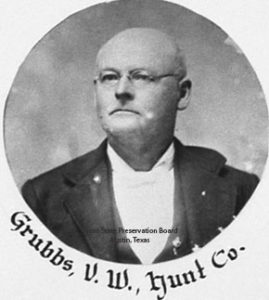As if you didn’t know, this is an election year. Many say it is one of the most repugnant they ever experienced. With television, newspapers, the various social media outlets, we have little reprieve from the issues and behavior of the candidates.
A look at the Greenville Messenger for July 8, 1898 proves that politics at that time were equally full of mud slinging and name-calling. The primary elections were even more important than they are today. Texas and other Southern states voted with the Democrat party. That is, white men who paid poll tax voted in the Democratic primary held in July and August. Other voters could only vote in November in the General election. Of course, women could not vote.
The United States was still recovering from the economic depression of 1893-1895. Many farmers had lost their land; most became tenant farmers with fewer opportunities to fulfill their goals or even care properly for families. Some turned to the Populist Party, in hopes of better conditions for farm families, but despised by businessmen.
On page 8 of the Greenville Messenger that day in July, the headline screamed A LIAR CRUCIFIED. “My opponent, B. Q. Evans, has been persistently asserting that I am a populist and have run for office on the populist ticket. The charge is an infamous falsehood. To substantiate his assertions Evans has a letter from one Ras Young, a two-by-four pettifogging lawyer of Longview, who wrote the letter to vent his personal spite against me. To refute the charge I submit the following letter from HON. R. C. DeGRAFFENRIED, United States representative from this District. Which will you pin your faith to – a well-known true blue democrat like DeGRAFFENRIED or B. Q. Evans and his unworthy accomplice? T. D. CAMPBELL”
We have no idea what Evans said about Campbell other than he was a Populist, but it is evident it raised the hairs on the back of Campbell’s neck. Campbell rebutted with a letter from the Congressman under the title READ THIS LETTER. Basically it said that Campbell, the incumbent, was “a Democrat and that I never heard of you voting any other ticket of affiliating with any other party . . .”
Ironically neither candidate won. They began their nit-picking, name-calling contest in February and continued until Election Day in July. However, men who were not impressed with the mudslinging convinced V. W. Grubbs to enter the race in May. Grubbs was well known and well liked. He was a staunch supporter of vocational education, a conviction much needed at that time period. He also firmly believed in prohibition. More importantly, businessmen, farmers, and tenants respected him. Not surprisingly, Grubbs won the election.
During the 1890s and into the 1900s, railroads were seen as the richest institution in America. The best way to get a little extra money was to claim or actually be involved in a railroad accident. One Greenville lawyer had a name for suing the Katy in particular. Over the years I have come to believe that B. Q. Evans was that lawyer. In light of that I suspect if any of the candidates were a Populist it was Evans.
DeGraffenried did give Campbell a few words of comfort. “You can always expect to hear reports when you enter the political ring and it is best not to worry over them.”


I’ve read that Andrew Jackson was accused of cannibalism during the campaign of 1828. Since I’m no Jackson fan, I’m not quite ready to rule it out. Still, I think that the rhetoric of 2016 might actually get more bizarro than “A LIAR CRUCIFIED”, or even accusations of cannibalism. I guess we’ll see, whether we want to or not. Thanks for the interesting post!